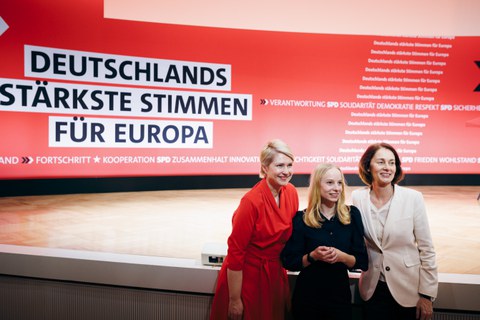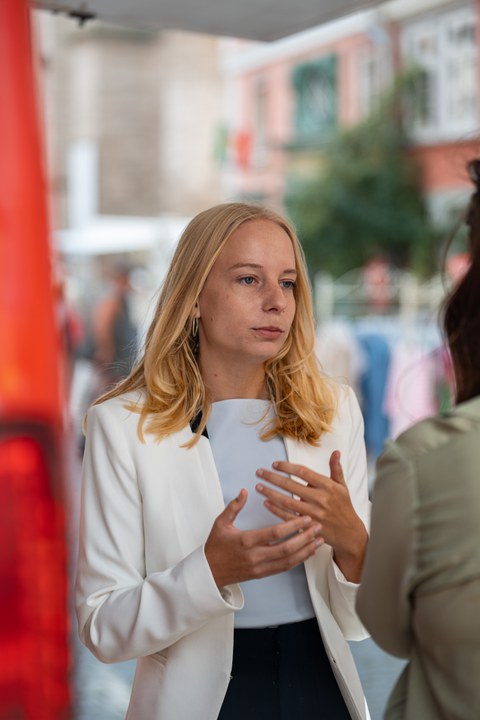“You can only bring about changes in society if you understand political processes.”
(interviewed in the year 2024)
Thomas Scheufler
Sabrina Repp was the first in her family to go to university. Her family's experiences during the reunification period inspired her involvement in politics at an early age, and she decided to study political science at TU Dresden for her Bachelor's degree and at the University of Rostock for her Master's. Today, Sabrina Repp is the youngest German member of the European Parliament, where she advocates for issues such as regional development and the promotion of young people in education and culture.
| Profile | Sabrina Repp |
| Degree program | B.A. Political science |
| Faculty | Faculty of Arts, Humanities and Social Science |
| Study period | 2017 - 2021 |
| Current work | Member of the European Parliament |

Sabrina Repp is the alumna of the month for December
Why did you decide to study at TU Dresden?
I decided to study at TU Dresden because I wanted to explore a new city and region while getting a high-quality education in political science. Moving to another federal state gave me the chance to become independent, reorganize myself, find a job, and meet new friends. It was a step into a new phase of my life that helped me grow personally. Looking back, it was absolutely the right decision for me.
What made you choose this degree program?
I grew up in the district of Rostock as the daughter of a painter and a cleaner. I learned early on what it means to get by on little money. This inequality and my parents' experiences after the fall of the Berlin Wall politicized me early on, leading me to join the Young Socialists at the age of 14. I chose political science because I wanted to understand the mechanisms behind social and political processes. You can only bring about changes if you understand these interrelationships. My volunteer work and my political science studies were therefore a perfect match.

Sabrina Repp with SPD party chairman Lars Klingbeil and Minister of State Reem Alabali-Radovan in a sports hall.
What researchers or lecturers influenced you the most during your studies?
During my studies, I worked as a student assistant at the Chair of Political Theory and the History of Political Thought. Dr. Steven Schäller and Prof. Mark Arenhövel had a particularly strong influence on me, teaching me the significance of different opinions and perspectives on the same subject. At the same time, I worked on the political education project Ich bin wählerisch! (I'm a picky voter!), which is run by the Aktion Zivilcourage, a civic education association, and wrote my Bachelor's thesis under Prof. Anja Besand at the Chair of Didactics of Civic Education. Her view of political education not only as a way of imparting facts, but also as a way of promoting skills in a democratic society has had a lasting influence on me. This approach also characterizes my work today, where I attach particular importance to dialogue with people on an equal footing. I see it as the responsibility of politicians to explain political processes in an understandable way and to bring them closer to the people.

Sabrina Repp, Member of the EU Parliament Katarina Barley and Prime Minister Manuela Schwesig.
Where are you employed today, and what are your responsibilities?
In June this year, I was elected to the European Parliament for the SPD. I am the youngest German member of parliament and represent my constituency of Mecklenburg-Western Pomerania and Saxony-Anhalt. In parliament, I am a member of the committees for regional development, for culture and education, and for gender equality and women's rights. I am delighted to be working in these committees on topics that are close to my heart: equal living conditions in the European Union, joint investments in infrastructure and the economy, cooperation in border regions, promoting young people in education and culture, youth exchanges and, of course, gender equality at all levels.
What advice would you give to our current first-years?
I would advise first-year students to be open to new perspectives and to actively engage with different opinions. Your time as a student is a time not only to accumulate knowledge, but also to learn to think critically and to question your own beliefs. Seize the opportunity to network and broaden your horizons. Remember that getting involved outside of the lecture hall – be it politically, socially or in projects – can be just as valuable as academic success. The most crucial thing is to see your studies as an opportunity to grow, both personally and professionally.
What do you remember most fondly about your time as a student?
Being the first in my family to be able to go to university, I kept coming across hurdles that I needed to overcome: How do I request financial aid from the BaföG office? How do I finance my studies if I no longer meet the requirements to receive the BaföG loan? Will I find a good job after graduating? It was a very special moment for me when I was asked to work as a student tutor at the Chair of Political Theory and the History of Political Thought. I saw it as a sign of recognition and appreciation for my commitment to the seminar, and at the same time as a sign that I had made the right decision in taking a degree in political science. From then on, I could help other students to better understand theories from Aristotle to Chantel Mouffe to Jacques Ranciere.
What was your favorite place on campus?
My favorite place at university was the “U-Boot” canteen. It was usually quieter than other canteens, and the food was almost always great. It was the perfect place to catch a break from studying in a relaxed atmosphere and to chat with fellow students.
What still has a lot of value for you today/would you like to have had more of?
The analytical perspective of political science continues to shape my thinking. Even as a politician, and especially in that role, I benefit from the fact that I was empowered to look at conflicts, interests and decision-making processes from different perspectives. In this context, it is important to understand that political science and politics are not always the same thing. While the tools of political science help me to better understand the processes, politics often requires simple communication, fast solutions, and sometimes an emotional escalation of the debate. This difference occasionally causes an inner conflict between my role as a political scientist and my work as a politician. I would have liked to learn a little more about how to better reconcile these two perspectives in order to be even more effective in my political work.
What tips do you have for hitting the ground running in your industry?

Sabrina Repp in conversation in a pedestrian zone
The best way to get a good start in my field is to have a strong network. It is crucial to think about your interests and how you want to use your energy and skills in a meaningful way even while you are still at university. Get involved in activities during your studies, and don't just think about joining a political party or association. Internships and part-time jobs can also open up promising avenues. In my case, it was my involvement in political education, in the party, and at the Institute of Political Science, that gave me valuable experience.
What connects you to TU Dresden today?
TU Dresden gave me the tools that I use every day to try and do my job as best as I can. Moreover, I continue to maintain close ties with people in Saxony, particularly with members of the SPD, my former fellow students, and also with stakeholders in political education. I am very grateful for the experiences I was able to gather there. In the Committee on Regional Development, I work directly with my colleague Matthias Ecke from Saxony, which allows me to incorporate regional perspectives into our work. On a very personal side, I also met my partner at TU Dresden. His family lives in Dresden, which is why I often come back to the city to spend time with them. These connections continue to make TU Dresden an essential part of my life.
Contact:
Sabrina Repp
Email
